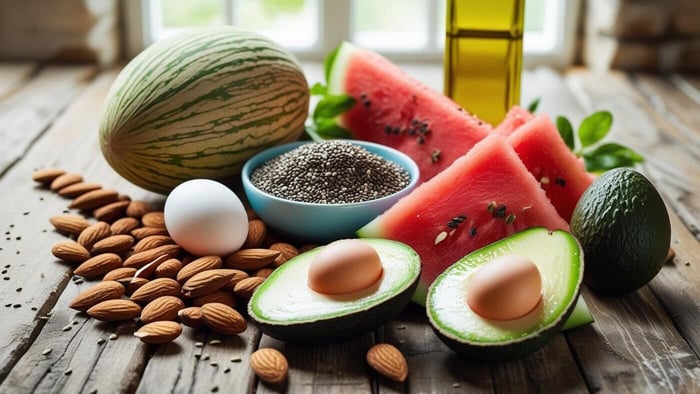Table of Contents
At a Glance
|
If you’re living with migraine, you likely know that certain foods may trigger symptoms. The good news is that some foods may actually help support migraine management.
From supporting brain energy and hydration to easing inflammation and balancing hormones, your daily food choices might make more of a difference than you realize. Some ingredients are naturally rich in nutrients linked to migraine support, including those involved in blood sugar stability, nerve signaling, and hormone regulation.
While individual needs vary, we favor a whole-foods, low-carb approach that avoids common dietary triggers like gluten, high-toxin foods, and excess sugars.
This guide takes a closer look at foods that help migraines, as they contain nutrients and natural compounds that may offer support. These include magnesium, B vitamins, omega-3s, potassium, riboflavin, CoQ10, and plant-based antioxidants.
Our daily lives can make it hard to consistently get all the helpful migraine-relevant nutrients through food alone, especially on symptom-heavy days or if you have specific dietary needs. But knowing which foods to focus on is a great place to start.
We’ve grouped these foods by their potential benefit, with a handy overview table to help you see everything clearly. You won’t need to overhaul your diet overnight, but understanding which foods work with your system can be a great first step.
Migraine-Supportive Food Categories at a Glance
Category | Example foods | Key Nutrients |
CoQ10 and Brain Energy Support Foods | Salmon*, organic liver*, heart (organic) Sardines | CoQ10, B vitamins, protein, healthy fats |
Anti-Inflammatory & Omega-3s | Flaxseed, walnuts, turmeric, ginger, cod*, cod liver oil* | Omega-3s, curcumin, polyphenols |
B Vitamin Rich Foods | Eggs, Greek yogurt, lentils*, quinoa* | B vitamins (especially B2 and B6), folate |
Hormone-Supportive & Healthy Fat Foods | Avocados, tofu*, edamame* | Healthy fats, plant-based phytoestrogens |
Hydrating and Blood Sugar Stabilizing Foods | Celery, Cucumber, sweet potatoes, coconut water | Hydration, complex carbs, magnesium, potassium |
Magnesium-Rich Foods | Dark chocolate, spinach, macadamias, pumpkin seeds, almonds, black beans*, chickpeas* | Magnesium, fiber, iron, zinc |
*These foods may be problematic for individuals sensitive to gluten, lectins, or dietary toxins. We recommend caution with grains, legumes, soy, and larger fish, and suggest organic or supplemental alternatives where appropriate.
The next section explores each group in more detail, with practical ways to add these foods to your routine.
Foods That Help with Migraines
CoQ10 and Brain Energy Support Foods
Migraine is often linked to disruptions in brain energy metabolism. These foods contain CoQ10 and other nutrients that may help support mitochondrial function and reduce oxidative stress.
Sushi (with fatty fish such as Salmon, Mackerel, & Tuna)
Sushi made with fatty fish such as salmon, mackerel, and tuna offers a natural source of CoQ10, a compound involved in mitochondrial energy production, a process that may be disrupted in people with migraine.
In addition to supporting energy metabolism, CoQ10 also functions as an antioxidant, helping to reduce oxidative stress, which is thought to play a role in migraine biology.
These types of fish are also rich in omega-3 fatty acids and vitamin D, which may help support brain health and reduce inflammation.
Be aware that larger fish such as tuna and salmon may contain environmental toxins. If you’re following a low-toxin plan to support migraine health, it’s better to choose small, cold-water fish like sardines in moderation, or consider a purified supplement.
Organ meats (e.g., beef liver, chicken liver, or kidneys)
Organ meats like beef heart or liver, chicken liver, or kidneys are also excellent dietary sources of CoQ10, and provide other important nutrients including vitamin B12, iron, and choline.
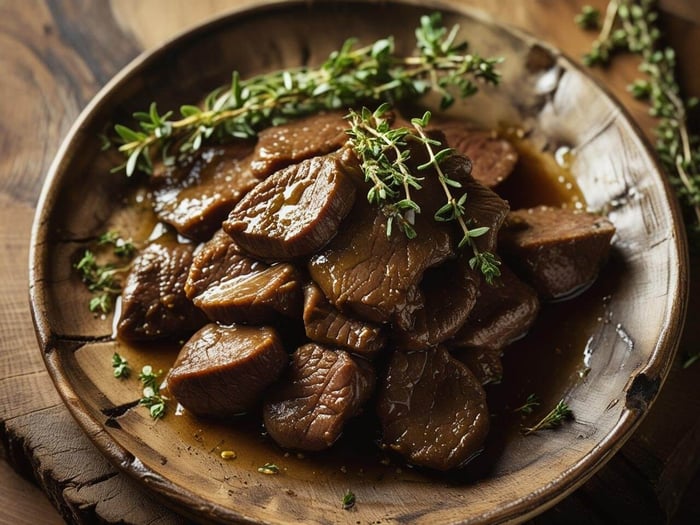
While not everyone's favorite, they are among some of the most nutrient-dense foods there are.
For those following a low-toxin approach, it’s important to choose organic, pasture-raised sources of meat, as organ tissues can accumulate heavy metals and other contaminants.
If organ meats aren’t part of your usual routine, you’ll be pleased to know that Brain Ritual® provides bioavailable CoQ10, along with other clinically relevant nutrients designed to support brain energy and help manage oxidative stress, all in a simple daily drink.
Brain Ritual® is a medical food intended for the dietary management of migraine under medical supervision. It is not intended to diagnose, treat, cure, or prevent any disease.
Anti-Inflammatory & Omega-3 Foods
Inflammation may play a part in migraine symptoms. The following foods contain omega-3s and plant compounds that may help ease it and support brain health.
Flaxseed
Flaxseed is a plant-based source of alpha-linolenic acid (ALA), a type of omega-3 fatty acid that may help reduce inflammation, a process thought to contribute to migraine onset.
It’s also rich in fiber and lignans, which may help support your hormonal balance and gut health. Two areas that many people find influence migraine risk.
Ground flaxseed is the most absorbable form, and it blends easily into smoothies, yogurt, or oatmeal for a simple daily nutritional boost.
Chia seeds
Chia seeds are also a great plant-based source of omega-3s, offering both ALA and hydration support, as they can absorb many times their weight in water.
Their gel-like quality may help support hydration and aid stable digestion. This may be beneficial for people who find that dehydration or gut issues trigger their migraines.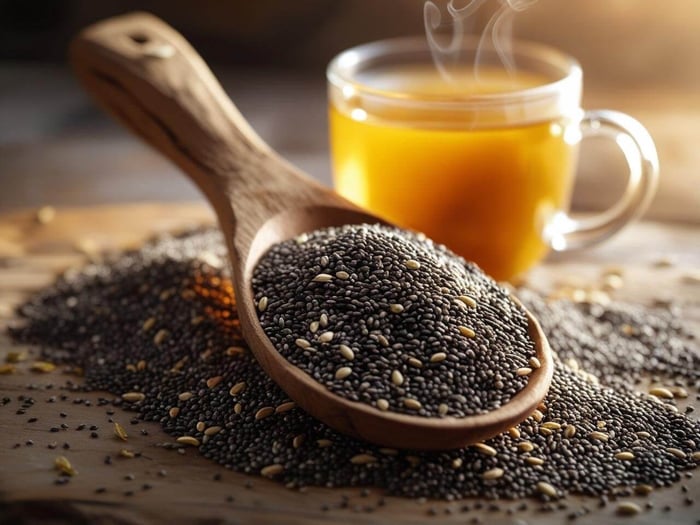
Chia seeds are also a natural source of magnesium and calcium, two minerals involved in nerve signaling and muscle relaxation.
Walnuts
Walnuts contain a range of beneficial nutrients, including omega-3 fatty acids, vitamin E, and polyphenols known for their antioxidant effects. These may help protect cells from free radical damage and support overall brain health.
While not as high in omega-3s as fatty fish, walnuts are a convenient, vegan-friendly snack that can fit into most people’s diets.
Turmeric
Turmeric contains curcumin, a natural compound with well-documented anti-inflammatory effects. It may help reduce inflammation by lowering certain chemical messengers like TNF-alpha or interleukins (IL-6, IL-1β), which have been linked to migraine and other chronic pain conditions.
Pairing turmeric with black pepper can help improve absorption. It works well in teas, golden milk, or curries as a gentle, daily anti-inflammatory boost.
Ginger
Ginger is best known for easing nausea, but it also has anti-inflammatory and antioxidant properties, making it one of several foods that help with migraines through gentle, natural support.
Some small studies suggest that ginger may help reduce migraine intensity or duration, especially when taken early in an episode.
It’s easy to incorporate ginger as a tea, fresh grated into food, or in powdered form. It may provide gentle support for both digestion and brain health.
B Vitamin Rich Foods
B vitamins are involved in energy production, nerve function, neurotransmitter balance, and cellular repair. All of these are important for people with migraine. Below are some natural ways to add key B vitamins to your diet.
Eggs
Eggs are a rich source of riboflavin (vitamin B2), a nutrient that helps support healthy cellular function and nervous system activity. Riboflavin has been studied for its potential role in reducing migraine frequency when taken consistently over time.
Eggs also provide choline, which supports brain function, and vitamin B12, which can help maintain healthy nerves and red blood cells.![Eggs salad, a food rich in B vitamins for brain health]](https://dropinblog.net/cdn-cgi/image/fit=scale-down,width=700/34261151/files/hard-boiled-eggs-salad-on-a-white-dish.jpg)
For people who can tolerate them, eggs are an affordable and versatile way to support brain health and your energy systems through food.
If you’re sensitive to eggs or avoid them for dietary reasons, Brain Ritual® offers a convenient alternative. It contains bioavailable forms of riboflavin, choline, and B12 — all in a science-backed formula designed to support brain energy and function, without the guesswork.
Greek yogurt
Greek yogurt provides several B vitamins, including riboflavin and B12. It is also rich in protein and probiotics, which may help support gut health, an area increasingly connected to migraine.
It’s a convenient option for a migraine friendly breakfast or a snack, and pairs well with low-glycemic fruits or flaxseed to make a balanced brain-friendly combination.
Choose full-fat, plain Greek yogurt without added sugars or artificial ingredients to align with a low-carb, whole-food approach.
While Greek yogurt offers many benefits, it’s important to note that dairy can be a trigger for some people with migraine. In these cases, unsweetened coconut yogurt can be a good alternative, but keep in mind that fermented foods may contain histamine, which comes with its own potential issues.
Lentils
Lentils are an excellent plant-based source of folate (vitamin B9) and vitamin B6, two nutrients that play a key role in supporting neurotransmitter balance and energy metabolism. They also contain magnesium, iron, and fiber, and may support glycemic control for many people with migraine.
However, as a legume, lentils contain lectins, which may make them unsuitable for those following a low-carb or low-toxin dietary approach. Individuals with gut sensitivities may prefer to limit them, or at the very least, prepare them using soaking or pressure-cooking methods to reduce potential irritants.
Lentils work well in soups, stews, or as a hearty base for grain bowls.
Quinoa
Quinoa is a complete plant-based protein that provides a variety of B vitamins, including B1, B2, and B6, along with magnesium and iron. Because it releases energy slowly, it can help maintain stable blood sugar levels, which may be especially important for people whose migraines are triggered by energy dips or spikes.
Although naturally gluten-free, quinoa is still a grain and may not suit those following a ketogenic or low-toxin plan.
For sensitive individuals, alternative sources of B vitamins such as leafy greens, eggs, or supplements may be a better fit.
Quinoa is easy to prep in batches and works well as a base for salads or warm dishes.
Chicken
Chicken is a great source of vitamin B6, which helps support the production of serotonin and dopamine, two neurotransmitters that play a role in pain regulation and mood.
It also provides niacin (B3) and protein, both of which are important for overall energy and nervous system function.
Including the skin can add beneficial fats, which help promote satiety and more stable blood sugar levels. Grilled, roasted, added to soups, or as part of a salad, chicken is an easy option to help create balanced, migraine-conscious meals. Including the skin can add beneficial fats, which help promote satiety and more stable blood sugar levels.
Hormone-Supportive & Healthy Fat Foods
Hormonal changes can be a major trigger for women affected by migraine, especially around menstruation, perimenopause, or during pregnancy. The options below contain healthy fats and nutrients that may support hormone balance and inflammation regulation.
Avocados
Avocados are rich in monounsaturated fats, which help support hormone balance and reduce inflammation. These are important factors for people whose migraines may be linked to hormonal fluctuations.
They are also a source of magnesium, potassium, and vitamin E, making them a nutrient-dense choice for brain and nerve health.
Easy to slice into salads, mash on toast, blend into smoothies, or spoon onto grain bowls, avocados are a flexible way to support your body through food.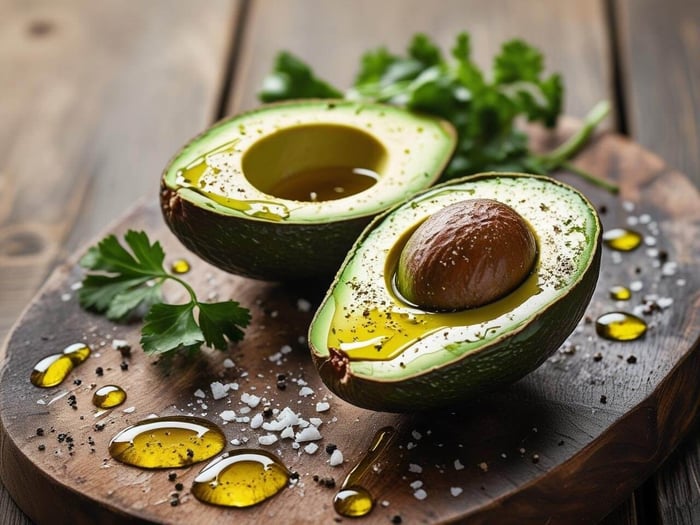
Tofu or edamame
Both tofu and edamame come from soybeans, a plant-based source of complete protein and isoflavones—compounds that may support estrogen balance, especially relevant for people affected by hormonal migraine patterns.
They also provide magnesium, iron, and several B vitamins, including folate and B6, which support brain health and energy metabolism.
Some people may wish to limit soy-based foods, especially if they’re sensitive to lectins or following a low-toxin or ketogenic diet. If you do include them, a sensible approach is to choose organic, non-GMO versions, and enjoy in moderation.
Tofu works well in stir-fries, scrambles, blended into sauces for extra creaminess, or grilled and added to wraps, while edamame makes an easy snack or protein boost in salads, noodle dishes, or enjoyed as a classic starter alongside CoQ10-rich sushi for a brain-friendly meal combo.
Olive oil
Extra virgin olive oil is a rich source of healthy monounsaturated fats and polyphenols, which have antioxidant and anti-inflammatory properties. These may help reduce oxidative stress and support overall brain health.
Regular use of olive oil in place of processed fats or oils may also contribute to more stable blood flow and hormonal balance, both relevant for migraine management.
Drizzle over salads, use in low-heat cooking, blend into dips like hummus, or simply add it to a rustic piece of bread to enjoy its benefits as part of a migraine-conscious diet.
Hydrating and Blood Sugar Stabilizing Foods
Dehydration and blood sugar swings are common dietary triggers. The foods in this group help support hydration and more stable energy, which may help ease symptoms in migraine-susceptible individuals.
Coconut water
Naturally rich in electrolytes like potassium and magnesium, coconut water can help support hydration. Many people with migraine need to replenish water, especially when symptoms are triggered by heat or mild dehydration.
It’s low in calories, tastes great, easy to digest, and often better tolerated than sugary sports drinks or caffeinated beverages.
Not everyone enjoys the taste of coconut water, and it’s not always enough on its own. Brain Ritual® includes magnesium, potassium, and other migraine-relevant nutrients in a thoughtfully formulated blend that supports hydration, energy, and brain function.
Cucumber
Did you know that cucumbers are technically a fruit? But in the kitchen, they’re a classic salad staple. Made up of over 95% water, they’re also one of the most hydrating foods around.
Staying well-hydrated is essential for people with migraine, as even mild dehydration can increase the chance of symptoms in sensitive individuals.
They also contain small amounts of potassium and magnesium, both of which are important for muscle and nerve function.
Toss them into salads, blend into smoothies, serve alongside spicy Thai food, or enjoy with a pinch of salt for a refreshing brain-friendly snack.
Watermelon
Watermelon is not only refreshing and naturally sweet, it’s also over 90% water. This makes it an excellent food for staying hydrated on hot days, especially when fluid loss may trigger migraine symptoms.
It also contains small amounts of potassium and magnesium. Because it's easy to digest, watermelon can be a good option when your appetite is low during or after a migraine.
That said, watermelon has a relatively high natural sugar content and so may not be suitable for those following a ketogenic or low-glycemic plan.
Enjoy it chilled on its own, tossed into salads, or blended into a light smoothie for a cooling, migraine-conscious treat.
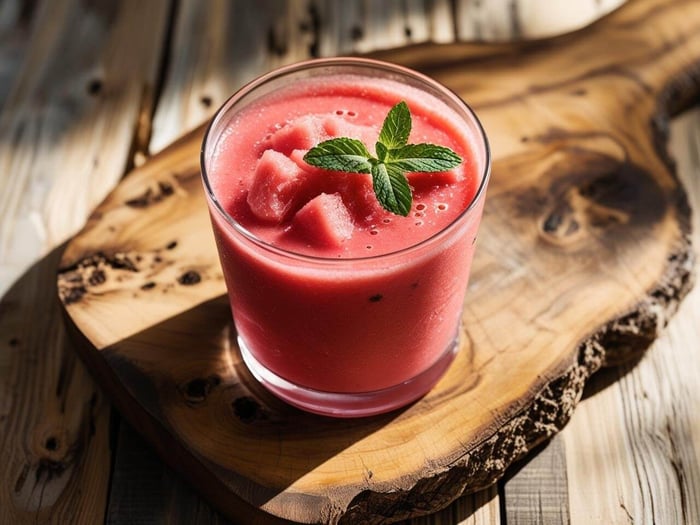
Certified Gluten-free Oats
As oats are a grain, they may be less suitable for those following a toxin-conscious or gluten-sensitive diet. While oats are naturally gluten-free, they contain a protein called avenin, which, though less problematic than gluten, may still trigger an immune response in some people. Oats are often processed in facilities that also handle wheat, barley, or rye, so cross-contamination is common unless they are certified gluten-free.
Oats provide slow-digesting carbohydrates that help maintain steady blood sugar levels. This can be especially important for people whose migraines are triggered by energy dips or rapid spikes. They are also a natural source of magnesium and vitamin B6, both of which support brain function and nerve health.
Oats can be used in a variety of ways. Try them as a warm breakfast with fruit and flaxseed, soaked overnight, blended into smoothies, or even in savory dishes like oat risotto.
Sweet potatoes
Nutrient-rich sweet potatoes are a great source of complex carbohydrates. These help maintain steady blood sugar levels and may reduce the risk of the spikes and crashes that can trigger migraines in some people.
They also contain vitamin B6, potassium, magnesium, and fiber, making them a smart choice for both brain and gut health.
Bake them, boil them, mash them, or cube and roast with olive oil as part of a satisfying and supportive meal.
Magnesium-Rich Foods
Magnesium plays a key role in nerve signaling, muscle function, vascular tone, and energy metabolism. The following foods are rich in magnesium and may help support systems that are often affected in migraine.
Spinach
Leafy greens like spinach are among the best natural sources of magnesium going. This mineral is involved in nerve transmission, muscle function, and maintaining cellular energy balance.
Many people with migraine may benefit from magnesium-rich foods, especially if their symptoms are tied to stress, hormonal changes, or poor sleep.
Lightly steaming spinach or blending it into smoothies is an easy way to increase your intake with little effort.
Pumpkin seeds
Pumpkin seeds (also known as pepitas) may be small, but they’re mighty when it comes to magnesium content.
They also contain zinc, iron, and healthy fats, providing a nutrient-dense way to support your nervous system and reduce inflammation.
Snack on them dry-roasted, sprinkle onto salads or oatmeal, or even blend into seed butters for a simple brain-friendly boost.
Almonds
Almonds deliver a good mix of magnesium, vitamin E, and healthy fats. This makes them a smart snack for people looking to support brain and cardiovascular health.
A small handful can help tide you over between meals while stabilizing blood sugar, which may reduce migraine risk in sensitive individuals.
Just keep in mind they’re quite calorie-dense, so a modest portion goes a long way. Try them raw, salted, roasted, or ground into almond butter.
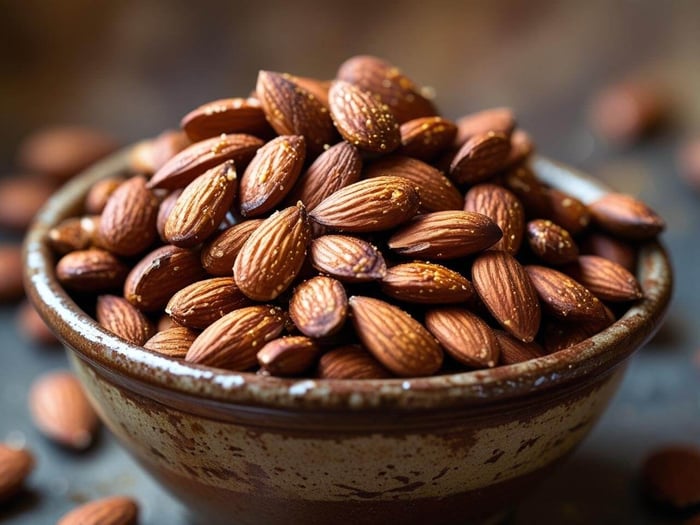
Black beans
Black beans are rich in magnesium, fiber, and protein. This trio helps support blood sugar balance and digestive health.
They’re also a source of folate and iron, nutrients important for energy production and cognitive function.
As a legume, black beans naturally contain lectins and may not suit individuals following a low-toxin or ketogenic approach. Soaking, sprouting, or pressure cooking may help reduce their potential for irritation.
Add them to soups, tacos, or salads for a satisfying, migraine-friendly addition to your meals.
Chickpeas
Chickpeas (garbanzo beans) are another excellent plant-based source of magnesium, B vitamins, and fiber.
They can support neurotransmitter balance and help keep your energy levels steady throughout the day.
Like other legumes, chickpeas may be less suitable for people sensitive to lectins or following a toxin-conscious plan. Preparation methods like soaking and pressure cooking can make them easier to digest for some.
Whether blended into hummus, roasted for a crunchy snack, stirred into stews, added to grain-free wraps, or tossed into salads, chickpeas are a flexible pantry staple.
|
Frequently Asked Questions About Food, Hormones, and Migraine
Wondering how food and hormones relate to migraine? These quick answers cover some of the most common questions.
What foods help with hormonal migraines?
Hormonal migraines are often triggered by fluctuations in estrogen, especially around menstruation or during perimenopause.
While triggers vary, some of the best foods that help with hormonal migraines include those rich in magnesium (like spinach or pumpkin seeds), B vitamins (such as eggs and lentils), and healthy fats (like avocados and walnuts).
These nutrients may support hormonal stability and brain health. Staying hydrated and eating regular, balanced meals is also important.
What foods help with menopause migraines?
During menopause, estrogen levels naturally decline, and this hormonal shift can unfortunately lead to more frequent migraines for some people.
Anti-inflammatory foods that help with menopause migraines include salmon, flaxseed, and turmeric. These may support hormone balance and reduce inflammation.
Magnesium and riboflavin also play a role in nerve and vascular function, which may be especially relevant during this phase.
For more on this topic, see our guide: Are migraines a menopause symptom?
Eating within an hour of waking and spacing meals evenly throughout the day can also support more stable energy levels. Pairing each meal with a glass of water adds another layer of protection, especially for people sensitive to skipped meals or fasting.
Is there a supplement that can help me get the nutrients I need to support migraine health?
If you're finding it difficult to get enough of these nutrients from food alone, you’ll be pleased to know that Brain Ritual® was developed as a daily nutritional approach to support people prone to migraines. It includes magnesium, riboflavin, CoQ10, and numerous other science-backed nutrients, all in forms that are easy for the body to absorb. Read more about our story.
Should I avoid caffeine if I get migraines?
Caffeine can be tricky for people with migraine. It may help some during an attack, but for others, it can act as a trigger or lead to rebound headaches. If you do consume it, try to keep your intake consistent and moderate. Consider keeping a diary to track whether it helps or worsens your symptoms.
Can skipping meals trigger migraines?
Yes. Irregular eating and blood sugar drops are well-known migraine triggers. Foods that provide a slow, steady release of energy, such as oats, lentils, and eggs, may help reduce these swings, especially when eaten regularly as part of balanced meals.
Final Thoughts
Now that you’ve seen how different foods may support migraine management, the key is to start small and stay consistent. You don’t need to change everything overnight, even small shifts like staying hydrated, eating at regular times, or adding some of the nutrient-rich foods mentioned above can make a meaningful difference over time.
Focusing on nutrient-dense, minimally processed foods can help support your body in managing symptoms, especially when paired with a regular routine of sleep, hydration, and balanced meals.
Looking for an Easier Way to Support Your Migraine Management?
Even with the best intentions, getting every migraine-relevant nutrient from food alone can be difficult, especially when life gets in the way.
That’s where Brain Ritual® can help. This twice-daily medical food was developed for the dietary management of migraine, using highly bioavailable forms of magnesium, riboflavin (B2), CoQ10, and other science-backed nutrients including D-Beta-Hydroxybutyrate, a unique ketone body that provides an efficient energy source for the brain.
Whether you’re struggling with specific triggers or simply want a steadier nutritional foundation, Brain Ritual® makes it easier to stay on top of your nutrient needs.
Try it now or learn more about how it works.
This content is for informational and educational purposes only and is not intended as medical advice. Always consult a healthcare professional before making health-related decisions.

